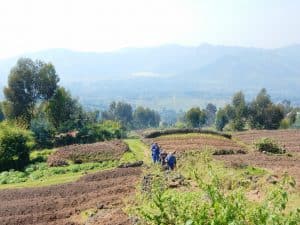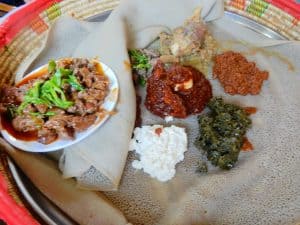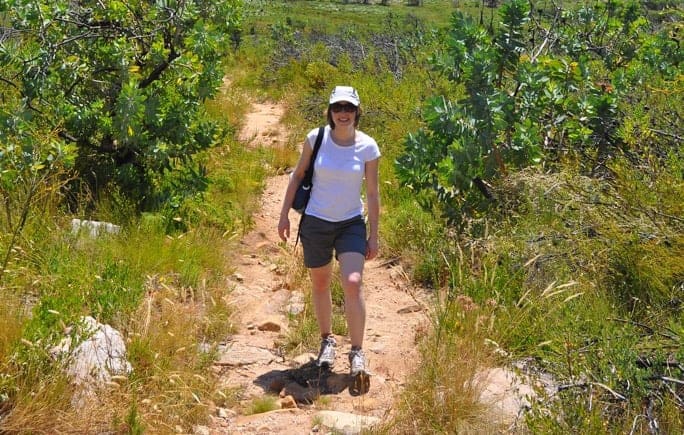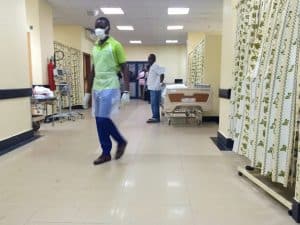Last year took me on several trips to Asia and Africa, including less travelled places like Rwanda and Benin.
When I tracked mountain gorillas in the Volcanoes National Park in Rwanda, walked the mountains of Tanzania, spent a few hectic days visiting markets of Addis Ababa, and toured Kampala in the rain, I was pregnant with my first child.
No, I’m not mad or particularly reckless. I’m aware of the risks – as my doctor said, staying on your sofa is much, much safer than travelling. I weigh the pros and cons and when I travel, I follow some basic rules that allow me to mitigate health risks in places where hygiene standards are lower than in most of the Western world, and where tropical diseases are prevalent.
Here are my 6 basic health rules:
1. Never leave home without up-to-date travel insurance
It may seem obvious that you should always have good travel insurance in place, but it wasn’t that obvious to me when I got really sick in South Africa and it turned out that health insurance was the one thing I hadn’t packed in my suitcase. That experience set me back 200 USD for a 10-minute consultation with a doctor (and it could have been thousands…) and taught me to always take good travel insurance tailored to the destination I’m going to and the activities I intend to undertake (e.g. some sports require a special top-up insurance).
Make sure you have details of your travel insurance on you, easily accessible should you need it. I usually bring a hardcopy and I keep an electronic one in Dropbox.
2. Make sure you’ve got your jabs in place
I know, jabs are not nice, they have a bad reputation, and a growing number of people are avoiding inoculations these days. That way they are not only exposing themselves to disease, but also putting others at risk. Without immunisation, one case can trigger an epidemic, and long-defeated pathogens can make a comeback. You absolutely must have your jabs in place. Check which ones are recommended for your destination and arrange them well in advance, as some are only effective after several weeks or require a booster.
If you don’t have your vaccinations in order, you may even be refused entry to some countries. For example, Tanzanian immigration requires your yellow fever book – proof that you’ve been vaccinated.

3. Be absolutely obsessive about malaria prevention
Many travellers to countries where malaria is prevalent (most of Sub-Saharan Africa and parts of Asia and South America) assume that they won’t catch the disease – because they’re only going for a short while, because they’re staying in a nice hotel, because they don’t normally get bitten by mosquitoes…
Well, they are wrong. Malaria is a very serious, potentially deadly, disease, and travellers are at a real risk. I knew a girl who didn’t believe in swallowing pills. Sadly, she died of falciparum malaria (the most common and the most deadly kind) in a hospital in Accra, Ghana.
You need to be absolutely obsessive: wear long sleeves and trousers after dusk; use a spray with at least 50% DEET; and take antimalarials (your doctor will advise which ones are appropriate for you). And if you do catch the disease (here are the symptoms to look out for), seek medical help immediately.
4. Water: bottled, boiled or sterilised
Water-borne pathogens are responsible for the bulk of infections you may get while travelling. Therefore, the golden rule is to stay away from tap water, water of unknown origin and any drinks with ice (except ice cubes served in top end hotels).
Buy bottled water, checking if the cap hasn’t been tampered with – some dishonest merchants fill bottles up with tap water. It happened to us in Vietnam – luckily we realised that the water was dirty, as it had visible dirt particles in it, and we returned it.
If you can’t buy bottled water, or don’t want to for environmental reasons, you can use chemical sterilising tablets, or boil water before drinking it.
5) Food: cooked, hot, peeled
Alongside water, food is a serious potential source of disease, in particular, if stored or prepared in unhygienic conditions. The basic rule is to stay away from food that hasn’t been cooked and isn’t piping hot, as high temperature will kill most of the harmful bacteria. Don’t eat salads or any raw fruit or veg that you haven’t peeled yourself.

Don’t get me wrong, I don’t want you to be paranoid and eat energy bars brought from home throughout your travels. Food is an important part of any culture and there are few pleasures greater than discovering the cuisine of a new country. In the case of food, I take some calculated risk. I love street food and I eat it, even if it means I get sick sometimes. It is a matter of being aware of risks and making an informed decision. In Ethiopia, I couldn’t resist the temptation of tasting street food, even though I was pregnant, but I asked a few locals for recommendations of trusted places to eat. You can’t always avoid falling victim to food poisoning. A colleague of mine got sick and ended up in hospital after a meal in one of the top hotels in Dar es Salaam. So, if you do get ill, see the following point.
6. Bring a first aid kit
Never travel without at least a basic first aid kit. Minor ailments frequently befall travellers and you don’t want to be looking for a pharmacy in a country whose language you may not speak.
The bare minimum is:
- Painkillers (e.g. paracetamol) – to treat fever, colds and small aches.
- Diarrhea treatment (e.g. Imodium and rehydration sachets) – this is the medication you will almost certainly need. Diarrhoea will usually pass by itself after a few days, but you need to manage the symptoms to be able to continue your travel.
- Plasters – to put on cuts and blisters.
- Disinfectant – to clean small wounds and cuts, as well as blisters.
- If applicable, malaria prophylaxis.
If you’re travelling to a remote area where medical help isn’t readily available, you may need a more sophisticated kit. You can buy these at travel clinics. When I travelled to Uganda and Ethiopia when pregnant, I bought a kit that included sterile syringes and needles in case I end up in the hospital, following the advice of the travel nurse.
Stay healthy, and enjoy your travels!
Please do consider supporting the Love Her Wild community by becoming a Patreon! Not only will you be helping women in accessing the outdoors, but there are great benefits including giveaways and access to an exclusive newsletter.
Anna lives in London with her family where she works in international development and public health. Her love of adventure has led her to travel to more than 40 countries.


